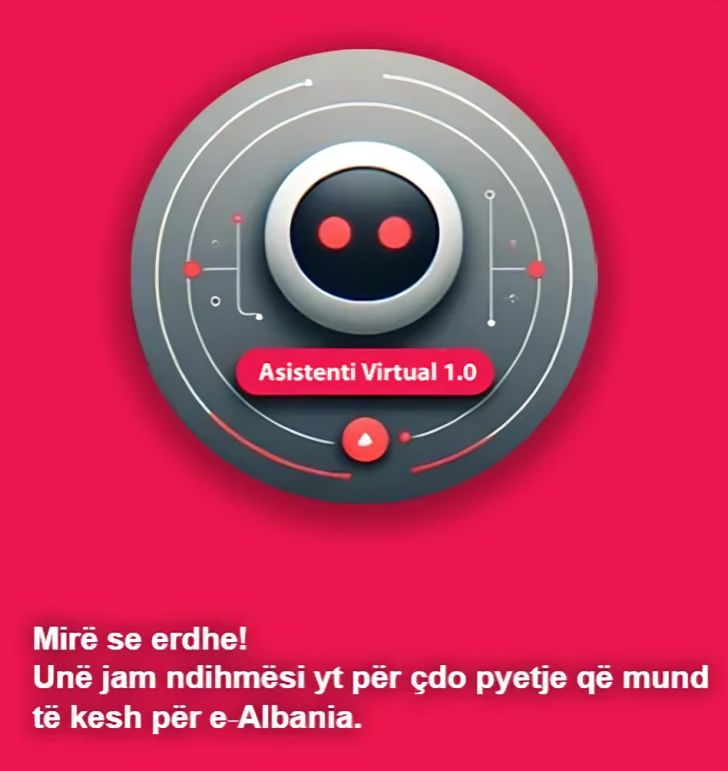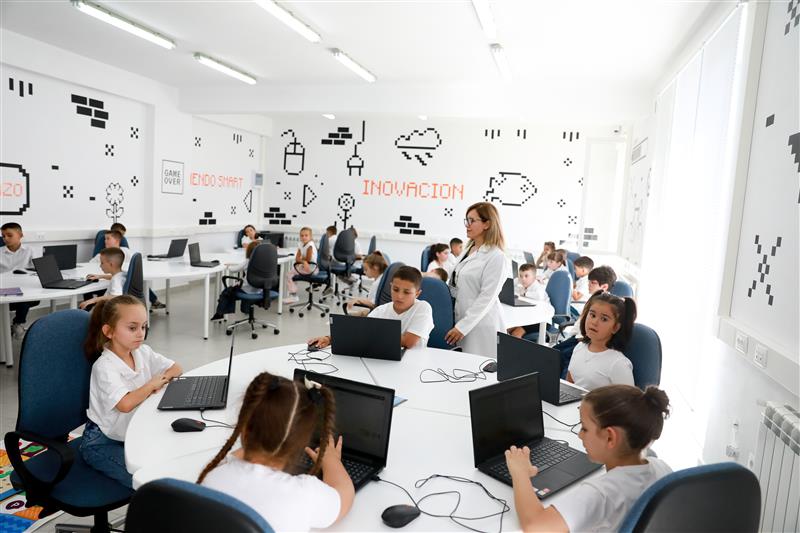Digital Revolution in Albania




The digital revolution of public services in Albania has fundamentally transformed the way citizens communicate with state institutions. With 1,253 online services, making up approximately 95% of all public services, the e-Albania platform has become a success story, ranking Albania first among countries in the region. The Albanian government has enabled the transition from physical counter services to online ones, offering citizens the opportunity to complete services via smartphones or computers, without waiting in line or wasting time. At the center of this transformation is the National Agency for Information Society, AKSHI. As the main institution responsible for digital governance in Albania, AKSHI develops, administers, and ensures the operation of state electronic systems, guaranteeing a secure, sustainable, and efficient infrastructure.
Since January 2020, documents and certificates for businesses have been provided through the electronic system SQDNE, facilitating the exchange of 590,000 documents between institutions. With the approval of this electronic system, the return response and administrative document with an electronic seal will be enabled for 448 applications processed through the e-Albania portal, which until now were issued with an electronic signature. This will bring the total number of documents with an electronic seal obtained electronically through e-Albania to 590.In addition, the improvement of this electronic system, used by 7,000 employees in public administration across 180 institutions and their functionalities, by employing microservices technology to ensure greater flexibility and performance, will make it possible to: reduce the time required to receive public services for citizens and businesses, while enhancing the quality of service provided by state institutions.
Since May 2022, all documents for public services are issued electronically, with an electronic seal or signature, eliminating physical contact, reducing opportunities for corruption, and increasing transparency. The real-time data exchange between 63 electronic registers via the Interoperability Platform has simplified the application process, automatically pre-filling 69% of forms on e-Albania. Procedures have been simplified, and the number of documents required from citizens and businesses has significantly decreased.
In just five years, these reforms have spared citizens and the economy over 620 million euro, 7,600 years and the equivalent of 25,000 roundtrips around the world saved in unnecessary travel and waiting time. This translates to families spending more time together, elderly citizens receiving quicker support, and businesses operating more efficiently. For Albanians abroad, consular services are now accessible without flights or queues, resulting in €57 million and 518 years of time saved in just five years.
Albania has also saved over 75 million sheets of paper, the equivalent of an entire forest. By avoiding paper production, 3.78 million kWh of energy and 752 million litres of water have been saved and 378 tons of CO₂ emissions have been avoided.
These developments have simplified bureaucracy, and increased transparency and quality of services.
It all started in 2013:
- 14 electronic services
- 50,000 registered users
- 51,000 public services provided on e-Albania
- 6 interconnected electronic systems on the Government Interoperability Platform
- 683,207 transactions on the Government Interoperability Platform
Today:
- 1,254 online public services
- 3.3 million registered users
- 49 million public services received via e-Albania
- 40 million documents with electronic seals generated
- 63 electronic systems interconnected on the Government Interoperability Platform
- 69% of data in service forms on e-Albania pre-filled automatically through real-time interaction
- 1,469,983,000 transactions on the Government Interoperability Platform since 2013
This extensive digitalization effort has also increased the importance of protecting the country's cyber ecosystem. Albania has built a strong and sophisticated defense to ensure the security of data and services provided to citizens, guaranteeing that information remains intact from malicious actors.

The transformation of citizen and business interaction with online public services has entered a new phase with the implementation of the Virtual Assistant. Launched in 2024, Virtual Assistant 1.0 managed over 1 million questions and provided quick and accurate responses.
VIRTUAL ASSISTANT/DIELLA
The transformation of citizen and business interaction with online public services has entered a new phase with the implementation of the Virtual Assistant. Launched in 2024, Virtual Assistant 1.0 managed over 1 million questions and provided quick and accurate responses. In January 2025, Diella 2.0 was launched — an intelligent avatar integrating natural language understanding with vocal and visual interaction, providing real-time information for public services and online applications on e-Albania. In just the first few months, Diella answered over 390,000 inquiries, significantly improving the user experience.
Diella 3.0 is now launched and under active use, with 54 types of documents across 45 services already implemented. This latest version enables full interaction through voice commands, allowing citizens to complete service requests using simple, conversational language — marking a major step forward in digital government accessibility.
Key sectors such as healthcare, education, employment and pensions, have undergone a total transformation, enabling easier and more efficient access for citizens. Thanks to electronic systems in each sector, electronic prescriptions, electronic grade registers, SMIP, and online pension applications are now possible, saving time, eliminating bureaucracy, and reducing the use of paper documents.
- With 4.3 million reimbursable prescriptions issued each year, chronically ill patients now experience significantly reduced waiting times.
- Referrals from family doctors to specialists are made online, allowing patients to choose the date and time of their appointments.
- Family doctor visit forms are now electronic, creating a complete and accurate record of every patient visit; currently covering 6 million visits annually.
- Blood donation has become more accessible and impactful, as citizens can now book appointments online, receive alerts when their blood type is needed, and respond promptly to save lives
- This current school year alone, vaccination cards for 30,000 students were sent automatically, enabled by seamless interaction between digital systems.
- 1.3 million registered users in the SMIP, Pre-university Education Information Management System, including parents, students, and educational staff.
- Only 3 documents, compared to 14 previously, are required to apply for an old-age pension.
Businesses now have access to a single electronic platform that allows them to obtain permits, licenses, tax certificates, and other necessary documents for their activities. This infrastructure has significantly simplified administrative processes, reduced bureaucracy, and lowered operational costs, creating a more efficient and transparent environment for enterprises.
- 40 million documents generated with electronic seal, 8.1 million of them, issued for businesses
- Permits System, e-Leje, 100% paperless, with 5 documents eliminated during the application process through interoperability, and 478 institutions being part of the integrated platform
- 43,000 applications for electronic licenses are submitted on average each year, submitted directly from a smartphone or computer, without waiting or bribery.

Albania’s Digital Agenda, the cross-sector strategy for digitization, is paving the way for the future by promoting work processes led by artificial intelligence, modern platforms, and enhanced cybersecurity measures. Investments in advanced technology, artificial intelligence, and the development of digital skills are shaping the next generation in the country. With coding and technology concepts starting as early as the first grade and smart labs being set up in schools across the country, Albania is creating a new generation of citizens and professionals prepared for the digital era.
- 300 schools in the country have been equipped with SmartLabs, and in the final phase of the project, around 615 more schools will be equipped, making it so almost all of our schools will have SmartLabs
- Information Communication Technology subjects are part of school curriculum from the first grade.
Albania became part of the Open Government Partnership, OGP, in 2011 and has continuously worked to increase transparency and citizen involvement in decision-making. As part of this commitment, our country is taking continuous steps to improve public services and expand access to open data as part of the OGP 2023-2025 Action Plan. A new development is the creation of the open data portal, which offers advanced functionalities and is in line with European Union standards. The portal provides advanced search, quality metadata, and support for different data formats such as JSON, CSV, XML, and RDF. It has fast performance and a user-friendly design, making access to and utilization of open data easier for citizens.


As the country continues to advance its digital infrastructure, cybersecurity remains a strategic priority. Protecting citizens' data and ensuring the security of electronic systems are essential for maintaining trust and the integrity of e-Governance. The Government Operational Security Center, GoV SOC, the most modern cybersecurity structure in Albania, provides 24/7 monitoring and response to any activity on the government network. Built on the latest Microsoft models and concepts, "Zero Trust" and "Defense-in-Depth," this center links data from different sources into a single solution for identifying and responding to incidents, ensuring advanced protection and resilience of the country’s digital infrastructure.

The launch of the new platform, e-Albania 2.0, will bring a significant improvement in user access and experience, offering more personalized, intuitive, and user-friendly services. Through proactive electronic services, the platform will be able to predict citizens' needs and deliver the service on time, without necessarily requiring the citizen to apply, making interactions with public administration even more efficient and easy. A “Mobile-by-Default” approach will be adopted, adapting electronic services for fast and easy access from mobile devices, in line with global trends and user preferences, as most users now access e-Albania primarily from smartphones.
Soon, citizens will have access to an integrated and omnichannel contact center, which will enable the quick resolution of their requests and questions related to electronic services. This system will provide unified support for citizens, ensuring a more efficient and comprehensive experience, while also strengthening digital inclusion for all users.
In 2023, Albania began integrating Artificial Intelligence, AI, into public services, under the guidance of AKSHI and with support from Microsoft and OpenAI. The first project realized was Virtual Assistant 1.0, followed by Diella.
In 2024, the methodology for the ethical use of AI was approved, and initiatives such as legal analysis and the detection of fiscal anomalies were undertaken.
AI was used to automate the process of Albania's integration into the EU. Albania has developed an artificial intelligence module that helps with translation, analysis, and comparison of national legislation with EU legislation. This module automates the creation for tables of concordance, ensuring a faster and more efficient process in aligning the legal framework with European standards.
Soon, procurement procedures will be fully automated through an electronic system supported by artificial intelligence, moving toward a "zero physical documents" and "zero communication with offices" model. The use of AI and machine learning will reduce human errors and automate processes such as drafting terms of reference, calculating the limit fund, and evaluating bids. This development will bring financial savings and create a more competitive, fair, and transparent environment for procurement.
In the taxation sector, artificial intelligence will be used to identify anomalies in fiscalization data and electronic invoices, helping reduce tax evasion and financial crime. This model will analyze electronic invoices and customs declarations in real-time, detecting suspicious transactions and increasing the efficiency of the process, while minimizing opportunities for corruption. The use of AI in healthcare will contribute to saving lives by helping doctors identify diseases in early stages through image analysis. The technology will enable more personalized treatment for patients, predict the development of diseases, and help in the early identification of epidemics, significantly improving the efficiency of the healthcare system. Albania’s digital transformation is not just a technological evolution—it is a significant step towards progress, efficiency, and empowering citizens. From e-Albania 2.0 to AI-assisted governance, Albania is leading a new era in public service delivery, setting new standards for modern administration. The digital future is already a reality, and Albania is moving forward as a success model in the region and beyond.